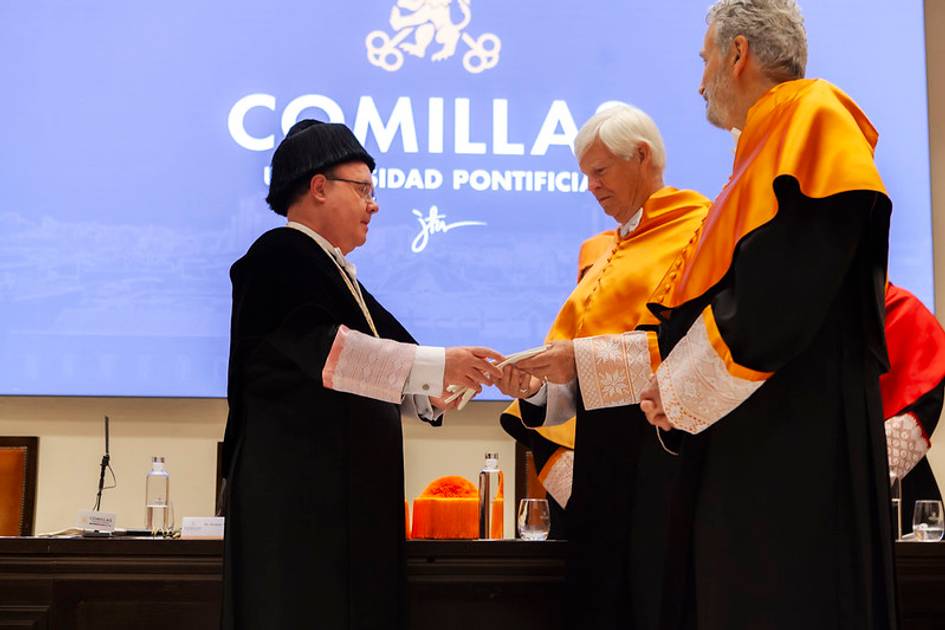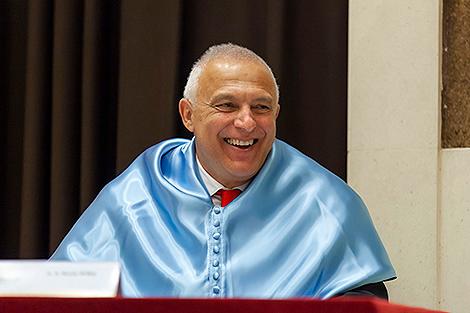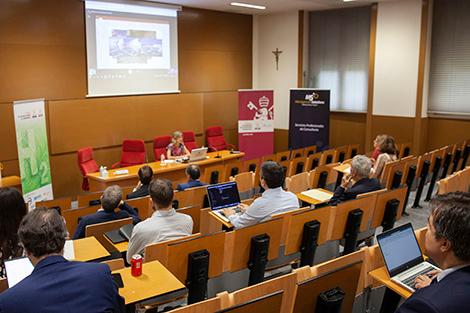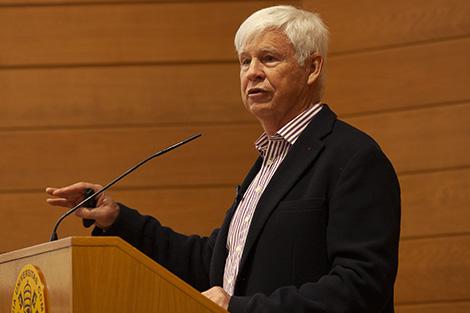Two Honoris Causa studying the relationship between climate change and finance
Robert F. Engle III and Eduardo Schwartz are the new Doctors Honoris Causa of Comillas for their teaching and research career

8 May 2024
The North American economist and Nobel Prize in Economics, Robert F. Engle, and the Chilean-born economist, Eduardo Schwartz, are now Honorary Doctors from Comillas Pontifical University, which has recognised their research career, their contribution to the resolution of fundamental problems in economics, finance and climate risks, as well as their current work on climate finance.
Images of the event
Professor Robert F. Engle was recognised for his development of econometric methods that have transformed empirical analysis in Economics and Finance, as well as the value of the ARCH (Autoregressive Conditional Heteroskedasticity) method, used to study the volatility of investment over time. Professor Eduardo Schwartz's contribution to the knowledge of the valuation of financial assets, natural resources, modelling the prices of raw materials and derivatives, and the analysis of market and credit risk was highlighted.
In his acceptance speech, Schwartz - who collaborates with the Faculty of Economics and Business Administration (Comillas ICADE) in several research projects - acknowledged that his academic efforts "have always been guided by intellectual curiosity", and congratulated himself on being one of the first researchers to push what is now called 'real options theory'. Schwartz has devoted recent years of research to studying the financial aspects of climate change, and the economic problems of sustainability and resources.
Robert F. Engle in his speech alluded to the impact of climate risk on financial markets. He offered some solutions from an economic point of view, he referred to the necessary impetus from public administrations to achieve zero emissions and meet the Paris commitments. "To reduce the damage that climate change is likely to cause, there must be a transition to a low-carbon economy. It is a costly transition that has to be financed by private capital, and public policies, through subsidies, taxation and regulation" he said.
The university's welcome
The Rector of Comillas, Enrique Sanz, SJ, recalled the words of Engle himself during his last visit to the University: "There are always periods of high and low volatility, and what really affects volatility is the speed with which people's expectations change: from what they read in the news and how that affects their view of the markets". In addition, Sanz recalled Schwartz's valuable contribution - "an enthusiastic and passionate teacher" - the huge number of papers and books published during his career in publications around the world, and the way he teaches students to think.
Isabel Figuerola-Ferretti, lecturer in Economics at Comillas ICADE, who introduced Engle, said that "his legacy is marked by the creation of pioneering tools of analysis, he has mentored and published work with a number of students, and he has shared his ideas and points of view, nurturing a generation of leading economists around the world".
In her laudatio, Teresa Corzo, Dean of the Faculty of Economics and Business Administration (Comillas ICADE), stated that "Professor Schwartz's contributions have been decisive in understanding the key factors in complex investment environments, for greater and better risk management, making it possible on many occasions to make decisions under uncertainty, and with it the arrival of capital allocation to areas in need of development, such as natural resources or innovation, or, more recently, in the transition to a more sustainable economy".
More info
You may also be interested in

El escritor, filósofo y humanista subraya el papel insustituible de los profesores, de la presencialidad y del humanismo

Dos cátedras organizan un encuentro con expertos internacionales en financiación de compañías y banca verde

Nobel Prize winner Robert Engle took part in a seminar organised by the Chair for Low Carbon Hydrogen Studies and Comillas ICADE
